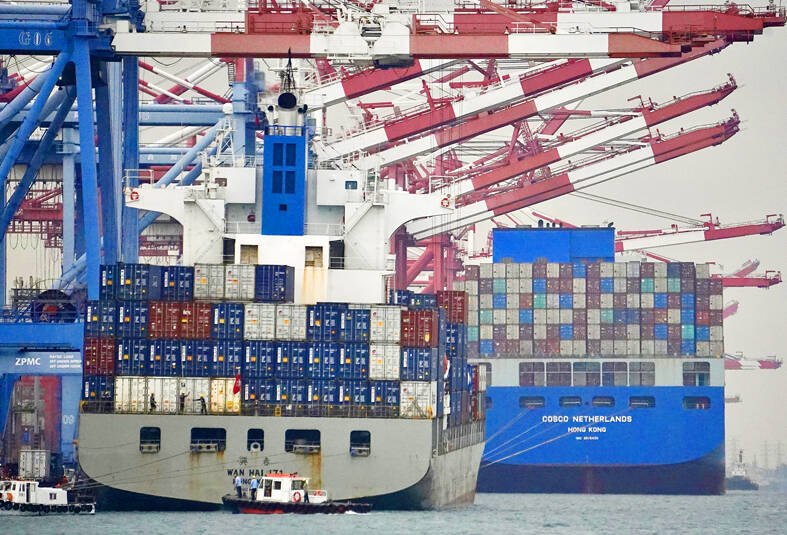Export orders last month surged 31 percent year-on-year to US$49.45 billion, driven by strong demand for servers and chips used in artificial intelligence (AI) and high-performance computing applications, the Ministry of Economic Affairs said yesterday.
New smartphone launches, China’s subsidies program targeting consumer electronics and information technology products, and front-loading orders to avoid US tariffs also helped lift last month’s export orders, the ministry said.
Last month’s figure surpassed the ministry’s estimate of US$43.5 billion to US$45.5 billion.

Photo: CNA
The growth momentum is expected to extend into this month with export orders forecast to expand between 10.3 percent and 14.5 percent to between US$52 billion and US$54 billion, Department of Statistics Director Huang Yu-ling (黃于玲) said by telephone.
That would bring aggregate export orders this quarter to between US$148.4 billion and US$150.4 billion, an annual increase of between 11.3 percent and 12.8 percent, Huang said.
“We are looking at a fourth straight quarter of growth in the first quarter,” Huang said. “AI demand remains strong and healthy.”
The ministry expects Chinese start-up DeepSeek’s (深度求索) low-cost AI models to have a positive impact on Taiwanese companies in the long term on expectations that their affordability would accelerate the uptake of AI applications.
However, non-technology sectors still face pricing competition from overseas rivals due to overcapacity and their prospects remain bleak, Huang said.
In the first two months of the year, export orders for electronic products soared 21.8 percent year-on-year to US$37.35 billion, and those of information and communications technology products increased 6.1 percent to US$25.83 billion, which the ministry attributed to the rising demand for chips, servers and networking products amid the AI boom.
Orders for optoelectronic products rose 7.7 percent to US$3.22 billion during the two-month period, thanks to improved selling prices of large TV panels and higher demand for optical inspection tools, the ministry said.
Machinery and mechanical equipment orders rose 3.5 percent to US$3.03 billion in the first two months, as strong demand for semiconductor equipment offset weak sales of automation systems and machine tools, it said.
Faced with intensifying price competition from overseas rivals, Taiwanese suppliers of base metal, plastic and rubber, and chemical products saw their orders decline 10.7 percent, 8.3 percent and 6.9 percent to US$3.64 billion, US$2.74 billion and US$2.65 billion respectively in the first two months, the ministry said.

DIVIDED VIEWS: Although the Fed agreed on holding rates steady, some officials see no rate cuts for this year, while 10 policymakers foresee two or more cuts There are a lot of unknowns about the outlook for the economy and interest rates, but US Federal Reserve Chair Jerome Powell signaled at least one thing seems certain: Higher prices are coming. Fed policymakers voted unanimously to hold interest rates steady at a range of 4.25 percent to 4.50 percent for a fourth straight meeting on Wednesday, as they await clarity on whether tariffs would leave a one-time or more lasting mark on inflation. Powell said it is still unclear how much of the bill would fall on the shoulders of consumers, but he expects to learn more about tariffs

NOT JUSTIFIED: The bank’s governor said there would only be a rate cut if inflation falls below 1.5% and economic conditions deteriorate, which have not been detected The central bank yesterday kept its key interest rates unchanged for a fifth consecutive quarter, aligning with market expectations, while slightly lowering its inflation outlook amid signs of cooling price pressures. The move came after the US Federal Reserve held rates steady overnight, despite pressure from US President Donald Trump to cut borrowing costs. Central bank board members unanimously voted to maintain the discount rate at 2 percent, the secured loan rate at 2.375 percent and the overnight lending rate at 4.25 percent. “We consider the policy decision appropriate, although it suggests tightening leaning after factoring in slackening inflation and stable GDP growth,”

Meta Platforms Inc offered US$100 million bonuses to OpenAI employees in an unsuccessful bid to poach the ChatGPT maker’s talent and strengthen its own generative artificial intelligence (AI) teams, OpenAI CEO Sam Altman has said. Facebook’s parent company — a competitor of OpenAI — also offered “giant” annual salaries exceeding US$100 million to OpenAI staffers, Altman said in an interview on the Uncapped with Jack Altman podcast released on Tuesday. “It is crazy,” Sam Altman told his brother Jack in the interview. “I’m really happy that at least so far none of our best people have decided to take them

PLANS: MSI is also planning to upgrade its service center in the Netherlands Micro-Star International Co (MSI, 微星) yesterday said it plans to set up a server assembly line at its Poland service center this year at the earliest. The computer and peripherals manufacturer expects that the new server assembly line would shorten transportation times in shipments to European countries, a company spokesperson told the Taipei Times by telephone. MSI manufactures motherboards, graphics cards, notebook computers, servers, optical storage devices and communication devices. The company operates plants in Taiwan and China, and runs a global network of service centers. The company is also considering upgrading its service center in the Netherlands into a